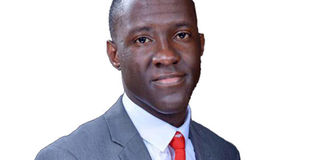What should be done to protect students from predatory teachers?

Kato Mpanga
What you need to know:
- Child protection policies. Having worked for the National Citizen Service (NCS) in the United Kingdom (UK) during the summer for the last five years, I have carefully observed how the organisation has endeavoured to implement the country’s child protection policies to protect its young people. NCS is a government programme run by private partners, which seeks to empower young people of between 15 to 17 years with different leadership and employability skills.
A few weeks ago, I wrote an article on a couple of online platforms regarding what we can do to help solve school defilement challenges in Uganda. Not so long after, defilement has still proven to be one of the never ending challenges in our schools.
Lately, the country has been awash with media reports of the alleged sodomy of a five-year-old child by a teacher at King Fahad Islamic Primary School in Busega, Wakiso District. Shortly before that, there were media stories of defilement of a Senior Two student of Wamala Mixed Secondary School in Mpambire, Mpigi District, by the school director.
In May 2017, the country was taken aback when the demise of the owner of one of the private schools in the country brought to light the fact that he had allegedly had tens of children with his former students, and possibly current students at the time.
The country continues to read stories about alleged cases of defilement in city and rural schools. I believe this comment will catch the eyes of some of the policy influencers, especially at the Ministry of Education, to find how best we can reduce defilement cases in our schools.
According to statistics from the Uganda Police’s Child and Family Protection Unit, more than 51,000 girls were defiled between 2014 and 2017. The question that comes to one’s mind as regards defilement cases in relation to schools is, is the Ministry of Education doing enough to prevent such from happening.
Having worked for the National Citizen Service (NCS) in the United Kingdom (UK) during the summer for the last five years, I have carefully observed how the organisation has endeavoured to implement the country’s child protection policies to protect its young people.
NCS is a government programme run by private partners, which seeks to empower young people of between 15 to 17 years with different leadership and employability skills. At the end of the summer or autumn programme, the young people graduate with certificates signed by the British Prime Minister.
Seeing defilement-related cases in Uganda got me pondering on what more could be done to prevent such cases from happening. Much as the Ministry of Education through the Education Service Commission (ESC) issued its reviewed Teacher’s Professional Code of Conduct in 2012 as empowered by The Education Service Act 2002, more should be done to help protect children from being abused.
Drawing from my experience of working with NCS, below are some of the precautions the organisation put in place to promote the welfare of its young people. Much as the measures could be affected by cultural or legal variations, the ESC could pick a leaf from what is crucial and enhance their policies accordingly.
First, one’s employment to work with children is subject to a thorough disclosure and barring service (DBS) check, renewable every three years. A DBS check is a record of one’s criminal convictions and cautions – carried out by the disclosure and barring service. The information issued is used to determine one’s suitability to perform a designated role. The ESC could suitably adjust this to Ugandan schools’ context by coming up with better ways of doing a thorough background check before recruiting any member of staff, among others.
Second, the organisation has seasonal safeguarding training. This could be applied to our Ugandan context by instituting mandatory child protection training before the commencement of each term.
Third, professionals working with children are not allowed to share their personal contact details or to have a child’s contacts during or outside the professional relationship, that is to say, mobile and social media contacts, among others. Young people are only allowed to contact members of staff through official channels such as their work phones or work email address. This could be adjusted to suit our Ugandan context by saying that members of staff are only allowed to have personal contacts of students with the explicit and documented permission of their parents, and notification of the school administration.
Fourth, professionals are not allowed to have any personal or sexual relationships with children even when they become of age in or outside the professional context.
The ESC could adjust this to the Ugandan context by stating that students will only be allowed to have personal contact with their former members of staff on completion of their high school, and on becoming 18 years and above. No sexual relations will be tolerated between members of staff and their former students, among others.
Fifth, a professional with or talking to a young person, should do so in the presence of another member of staff. The ESC could adopt this by saying that a member of staff can only have a one-to-one conversation with a student either in the presence of another member of staff, or in an open place that is visible to all.
Lastly, media consent. Professionals are only allowed to take children’s photos with documented consent from their parents. Furthermore, professionals are only allowed to take these pictures using the organisation’s, and not personal devices. No professional is allowed to share children’s pictures on any platform unless the pictures or videos have been produced via the organisation’s official platforms. These and more could be discussed and adopted to strengthen the ministry’s existing child protection policies.
Mr Mpanga is a Law student at Oxford Brookes University, Oxford, UK. [email protected]
@KatoMpanga




